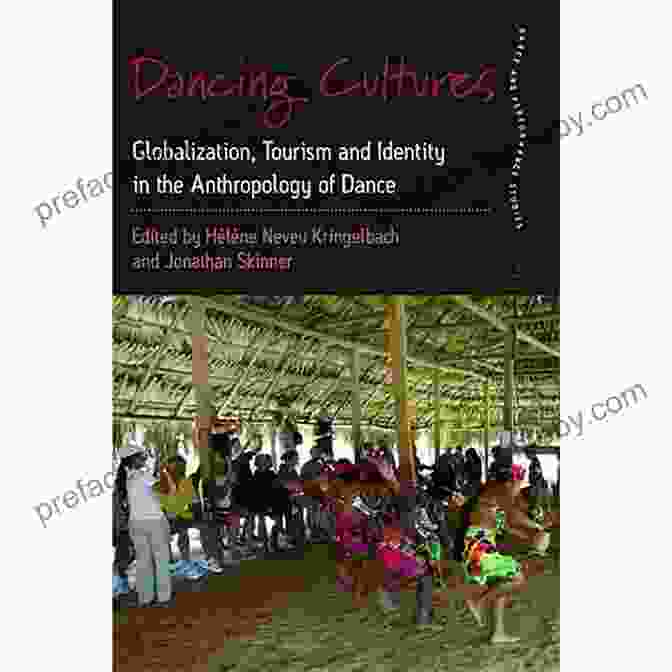Globalization, Tourism, and Identity in the Anthropology of Dance: Exploring the Dance and Identity Nexus


The dynamic interplay between globalization, tourism, and identity has captivated scholars and practitioners in various disciplines, including anthropology. Within the anthropology of dance, this nexus holds immense significance as it examines how dance practices shape and are shaped by global forces, tourist encounters, and individual and collective identity formations. This article delves into the intricate relationship between globalization, tourism, and identity in the anthropology of dance, exploring its theoretical underpinnings, empirical research, and implications for cultural preservation, identity politics, and intercultural dialogue.
5 out of 5
| Language | : | English |
| File size | : | 7012 KB |
| Text-to-Speech | : | Enabled |
| Screen Reader | : | Supported |
| Enhanced typesetting | : | Enabled |
| Word Wise | : | Enabled |
| Print length | : | 404 pages |
Globalization and the Transformation of Dance Practices
Globalization has propelled the dissemination of dance forms across geographical and cultural boundaries, fostering new encounters, collaborations, and hybrid expressions. As dance practices circulate globally, they encounter diverse audiences, contexts, and interpretations, leading to their transformation and adaptation. For instance, the spread of ballet from its European origins to various parts of the world has resulted in the emergence of distinct national and regional ballet styles, each with its unique aesthetic and technical characteristics.
Moreover, globalization has facilitated the commodification of dance, turning it into a form of cultural capital that can be bought, sold, and consumed. Dance companies and performers increasingly tour internationally, catering to global audiences seeking exotic and authentic dance experiences. This commercialization of dance can impact the authenticity and integrity of traditional dance forms, potentially leading to their standardization and homogenization.
Tourism and the Performance of Dance
Tourism has become a major force in shaping dance practices and performances around the world. Tourists seek out dance as a form of entertainment, cultural immersion, and personal enrichment. In response, local communities and dance practitioners have adapted their dance performances to cater to tourist demands, sometimes altering their traditional forms and meanings to appeal to foreign audiences.
For example, in Bali, Indonesia, the Kecak dance, a traditional ritual performance, has been transformed into a popular tourist attraction. While the dance retains its core elements, it has been shortened and adapted to fit into tourist itineraries, potentially diluting its spiritual and cultural significance.
Identity Formation through Dance
Dance plays a pivotal role in the formation and expression of individual and collective identities. Through dance, people communicate their cultural values, beliefs, and histories. Dance practices can provide a sense of belonging, continuity, and empowerment, reinforcing group cohesion and distinctiveness.
In the context of globalization and tourism, dance can become a potent tool for identity negotiation and resistance. As individuals and communities grapple with the influx of global influences and the pressures of tourism, dance can serve as a means to preserve cultural heritage, assert local identities, and challenge dominant narratives.
Theoretical Frameworks
The anthropology of dance draws upon various theoretical frameworks to understand the complex relationship between globalization, tourism, and identity. These frameworks include:
- Cultural globalization theory examines the processes by which cultural practices and meanings circulate and transform across global networks.
- Commodification theory explores the ways in which cultural forms are transformed into commodities that can be bought and sold.
- Performance theory focuses on the performative aspects of dance, considering how dance is constructed, enacted, and interpreted.
- Identity theory investigates the formation, negotiation, and expression of individual and collective identities.
Empirical Research
Empirical research in the anthropology of dance has provided rich insights into the interplay between globalization, tourism, and identity. Studies have explored how:
- Globalization has influenced the dissemination and transformation of dance practices in different cultural contexts.
- Tourism has shaped the performance and consumption of dance, leading to both cultural preservation and potential commodification.
- Dance has played a role in the formation and expression of individual and collective identities, both in local and global contexts.
Implications
The research on globalization, tourism, and identity in the anthropology of dance has significant implications for cultural preservation, identity politics, and intercultural dialogue. It highlights the need for:
- Preserving cultural heritage: Recognizing the potential impact of globalization and tourism on traditional dance forms, it is crucial to implement measures to safeguard their authenticity and integrity.
- Empowering local communities: Local communities should be actively involved in the management and presentation of their dance practices, ensuring that they benefit from tourism and that their cultural heritage is respected.
- Promoting intercultural dialogue: Dance can serve as a powerful bridge between cultures, fostering mutual understanding, appreciation, and respect.
The nexus between globalization, tourism, and identity in the anthropology of dance is a complex and ever-evolving field of inquiry. By examining how dance practices are shaped by global forces, tourist encounters, and identity formations, anthropologists provide valuable insights into the dynamics of cultural change, identity politics, and intercultural dialogue. Their research contributes to a deeper understanding of the role of dance in shaping and reflecting the human experience in an increasingly globalized and interconnected world.
5 out of 5
| Language | : | English |
| File size | : | 7012 KB |
| Text-to-Speech | : | Enabled |
| Screen Reader | : | Supported |
| Enhanced typesetting | : | Enabled |
| Word Wise | : | Enabled |
| Print length | : | 404 pages |
Do you want to contribute by writing guest posts on this blog?
Please contact us and send us a resume of previous articles that you have written.
 Book
Book Novel
Novel Page
Page Chapter
Chapter Text
Text Story
Story Genre
Genre Reader
Reader Library
Library Paperback
Paperback E-book
E-book Magazine
Magazine Newspaper
Newspaper Paragraph
Paragraph Sentence
Sentence Bookmark
Bookmark Shelf
Shelf Glossary
Glossary Bibliography
Bibliography Foreword
Foreword Preface
Preface Synopsis
Synopsis Annotation
Annotation Footnote
Footnote Manuscript
Manuscript Scroll
Scroll Codex
Codex Tome
Tome Bestseller
Bestseller Classics
Classics Library card
Library card Narrative
Narrative Biography
Biography Autobiography
Autobiography Memoir
Memoir Reference
Reference Encyclopedia
Encyclopedia Eliza Ruhamah Scidmore
Eliza Ruhamah Scidmore Linda Marie Westervelt
Linda Marie Westervelt Kristen Johnston
Kristen Johnston Kaiya Stone
Kaiya Stone Elizabeth Vargas
Elizabeth Vargas Elizabeth Marshall Thomas
Elizabeth Marshall Thomas Eileen Bailey
Eileen Bailey Florence Sydney
Florence Sydney Mary Randolph
Mary Randolph Eliza Watson
Eliza Watson Ellie Kozlowski
Ellie Kozlowski Tya Marie
Tya Marie Eric Burns
Eric Burns Elaine Raphael
Elaine Raphael Elena Dunkle
Elena Dunkle Emmett W Hines
Emmett W Hines Justin M Monehen
Justin M Monehen Storytime Publishing
Storytime Publishing John Miller
John Miller Eric Schmitz
Eric Schmitz
Light bulbAdvertise smarter! Our strategic ad space ensures maximum exposure. Reserve your spot today!

 Shannon SimmonsThe New Click To Calm: Your Comprehensive Guide to Digital Detox and Inner...
Shannon SimmonsThe New Click To Calm: Your Comprehensive Guide to Digital Detox and Inner...
 Phil FosterIf You Want to Be a Winner, Change Your Travel Philosophy Now: Unleashing the...
Phil FosterIf You Want to Be a Winner, Change Your Travel Philosophy Now: Unleashing the... Finn CoxFollow ·12.5k
Finn CoxFollow ·12.5k Tyler NelsonFollow ·19.9k
Tyler NelsonFollow ·19.9k Ethan GrayFollow ·7.1k
Ethan GrayFollow ·7.1k Emilio CoxFollow ·15.6k
Emilio CoxFollow ·15.6k Yasunari KawabataFollow ·14.4k
Yasunari KawabataFollow ·14.4k Samuel Taylor ColeridgeFollow ·4.9k
Samuel Taylor ColeridgeFollow ·4.9k Herbert CoxFollow ·16.6k
Herbert CoxFollow ·16.6k Brian WestFollow ·18.3k
Brian WestFollow ·18.3k

 Richard Adams
Richard AdamsGame Development with Rust and WebAssembly: A...
Are you passionate...

 David Baldacci
David BaldacciGendered Identity and Aspiration on the Globalized Shop...
: The Convergence of Gender, Identity, and...

 Natsume Sōseki
Natsume SōsekiFresh Eyes On Panama: A Captivating Exploration of a...
Panama, a country often overshadowed by its...

 Adrian Ward
Adrian WardThe Life and Masterworks of J.M.W. Turner: A Timeless...
The Man Behind the Masterpieces ...
5 out of 5
| Language | : | English |
| File size | : | 7012 KB |
| Text-to-Speech | : | Enabled |
| Screen Reader | : | Supported |
| Enhanced typesetting | : | Enabled |
| Word Wise | : | Enabled |
| Print length | : | 404 pages |












